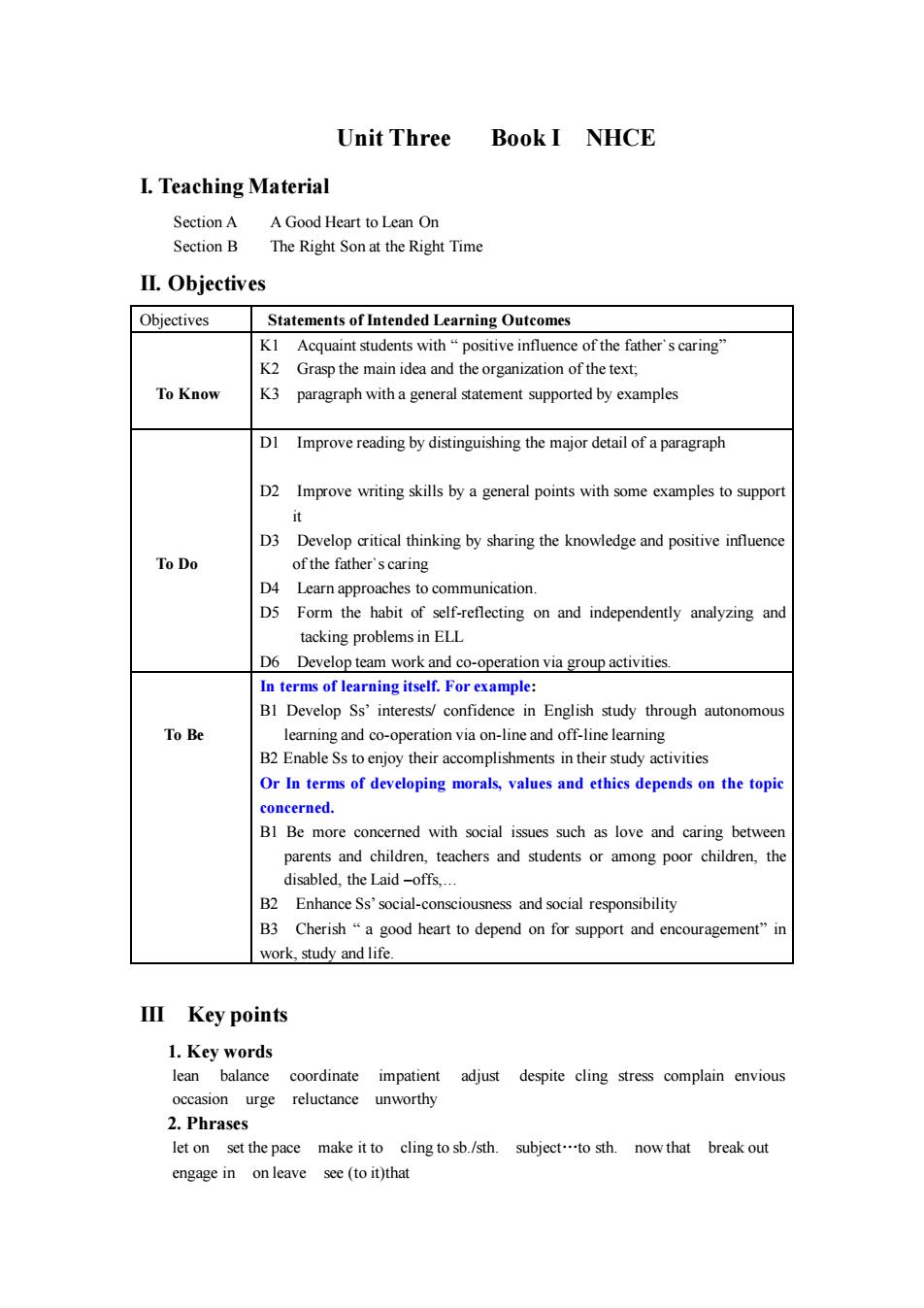
Unit Three BookI NHCE I.Teaching Material Section A A Good Heart to Lean On Section B The Right Son at the Right Time Ⅱ.Objectives Objectives Statements of Intended Learning Outcomes KI Acquaint students with"positive influence of the father's caring" K2 Grasp the main idea and the organization of the text. To Know K3 paragraph with a general statement supported by exampl DI Improve reading by distinguishing the major detail of a paragraph D2 Improve writing skills by a general points with some examples to suppo D3 Develop critical thinking by sharing the knowledge and positive influence ToDo of the father's caring D4 Learn approaches to communication. D5 Form the habit of self-reflecting on and independently analyzing and tacking problemsin ELL D6 Develop team work and co-operation via group activities In terms of learning itself.For example: BI Develop Ss'interests/confidence in English study through autonomous To Be learning and co-operation via on-line and off-line learning B2 Enable Sstoenjoy their accomplishments in their study activities Or In terms of developing morals,values and ethies depends on the topi concerned. Bl Be more concerned with social issues such as love and caring between parents and children,teachers and studentsor among poor children,the disabled,the Laidoffs,. B2 Enhance Ss'social-consciousness and social responsibility B3 Cherish"a good heart to depend on for support and encouragement"in work.study and life. III Key points 1.Key words lean balance coordinate impatient adjust despite cling stress complain envious occasion urge reluctance unworthy 2.Phrases let on set the pace make it to cling to sb./sth.subject.to sth.now that break out engage in on leave see(to it)that
Unit Three Book I NHCE I. Teaching Material Section A A Good Heart to Lean On Section B The Right Son at the Right Time II. Objectives Objectives Statements of Intended Learning Outcomes To Know K1 Acquaint students with “ positive influence of the father`s caring” K2 Grasp the main idea and the organization of the text; K3 paragraph with a general statement supported by examples To Do D1 Improve reading by distinguishing the major detail of a paragraph D2 Improve writing skills by a general points with some examples to support it D3 Develop critical thinking by sharing the knowledge and positive influence of the father`s caring D4 Learn approaches to communication. D5 Form the habit of self-reflecting on and independently analyzing and tacking problems in ELL D6 Develop team work and co-operation via group activities. To Be In terms of learning itself. For example: B1 Develop Ss’ interests/ confidence in English study through autonomous learning and co-operation via on-line and off-line learning B2 Enable Ss to enjoy their accomplishments in their study activities Or In terms of developing morals, values and ethics depends on the topic concerned. B1 Be more concerned with social issues such as love and caring between parents and children, teachers and students or among poor children, the disabled, the Laid –offs,. B2 Enhance Ss’social-consciousness and social responsibility B3 Cherish “ a good heart to depend on for support and encouragement” in work, study and life. III Key points 1. Key words lean balance coordinate impatient adjust despite cling stress complain envious occasion urge reluctance unworthy 2. Phrases let on set the pace make it to cling to sb./sth. subject.to sth. now that break out engage in on leave see (to it)that
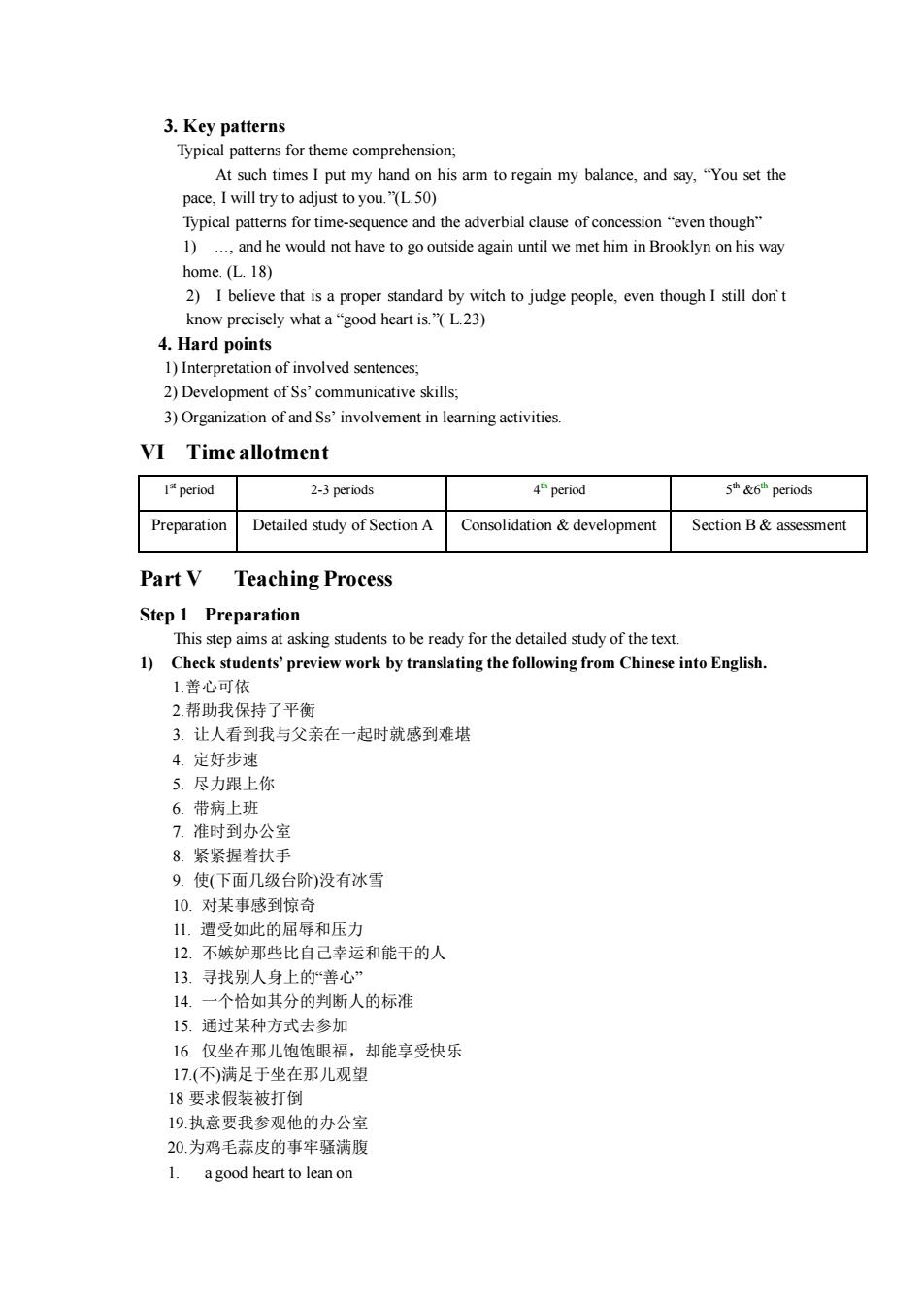
3.Key patterns Typica ns for theme comprehension At such times I put my hand on his arm to regain my balance,and say,"You set the pace,I will try to adjust to you.(L.50) Typical patterns for time-sequence and the adverbial clause of concession"even though" 1)and he would not have to go outside again until we met him in Brooklyn on his way home.(L.18) 2)I believe that is a proper standard by witch to judge people,even though I still don know precisely what a"good heart is.(L.23) 4.Hard points 1)Interpretation of involved sentences. 2)Development of Ss'communicative skills 3)Organization of and Ss'involvement activitie VI Time allotment 1period 2-3 periods 4period periods Preparation Detailed study of SectionA Consolidationdevelopment Section B&assessment Part V Teaching Process Step 1 Preparation This step ims at asking students tobe ready for the detailed study of the tex 1)Check stu ents'preview work by translating the following from Chinese into English 1.善心可依 2帮助我保持了平衡 3.让人看到我与父亲在一起时就感到难堪 4定好北速 5.尽力跟上你 6.带病上班 7.准时到办公宝 8紧紧握若扶手 9.使(下面几级台阶)没有冰香 10.对某事感到惊奇 遭受如此的屈辱和压力 12.不嫉妒那些比自己幸运和能干的人 13.寻找别人身上的“善心 14.一个恰如其分的判断人的标湘 15通讨某种方式去参加 16.仅坐在那儿饱饱眼福 却能享受快乐 17.(不)满足于坐在那儿观望 18要求假装被打倒 19.执意要我参观他的办公室 20为鸡毛蒜皮的事牢骚满腹 1. agood heart to leanon
3. Key patterns Typical patterns for theme comprehension; At such times I put my hand on his arm to regain my balance, and say, “You set the pace, I will try to adjust to you.”(L.50) Typical patterns for time-sequence and the adverbial clause of concession “even though” 1) ., and he would not have to go outside again until we met him in Brooklyn on his way home. (L. 18) 2) I believe that is a proper standard by witch to judge people, even though I still don`t know precisely what a “good heart is.”( L.23) 4. Hard points 1) Interpretation of involved sentences; 2) Development of Ss’ communicative skills; 3) Organization of and Ss’ involvement in learning activities. VI Time allotment 1 st period 2-3 periods 4 th period 5 th &6th periods Preparation Detailed study of Section A Consolidation & development Section B & assessment Part V Teaching Process Step 1 Preparation This step aims at asking students to be ready for the detailed study of the text. 1) Check students’ preview work by translating the following from Chinese into English. 1.善心可依 2.帮助我保持了平衡 3. 让人看到我与父亲在一起时就感到难堪 4. 定好步速 5. 尽力跟上你 6. 带病上班 7. 准时到办公室 8. 紧紧握着扶手 9. 使(下面几级台阶)没有冰雪 10. 对某事感到惊奇 11. 遭受如此的屈辱和压力 12. 不嫉妒那些比自己幸运和能干的人 13. 寻找别人身上的“善心” 14. 一个恰如其分的判断人的标准 15. 通过某种方式去参加 16. 仅坐在那儿饱饱眼福,却能享受快乐 17.(不)满足于坐在那儿观望 18 要求假装被打倒 19.执意要我参观他的办公室 20.为鸡毛蒜皮的事牢骚满腹 1. a good heart to lean on
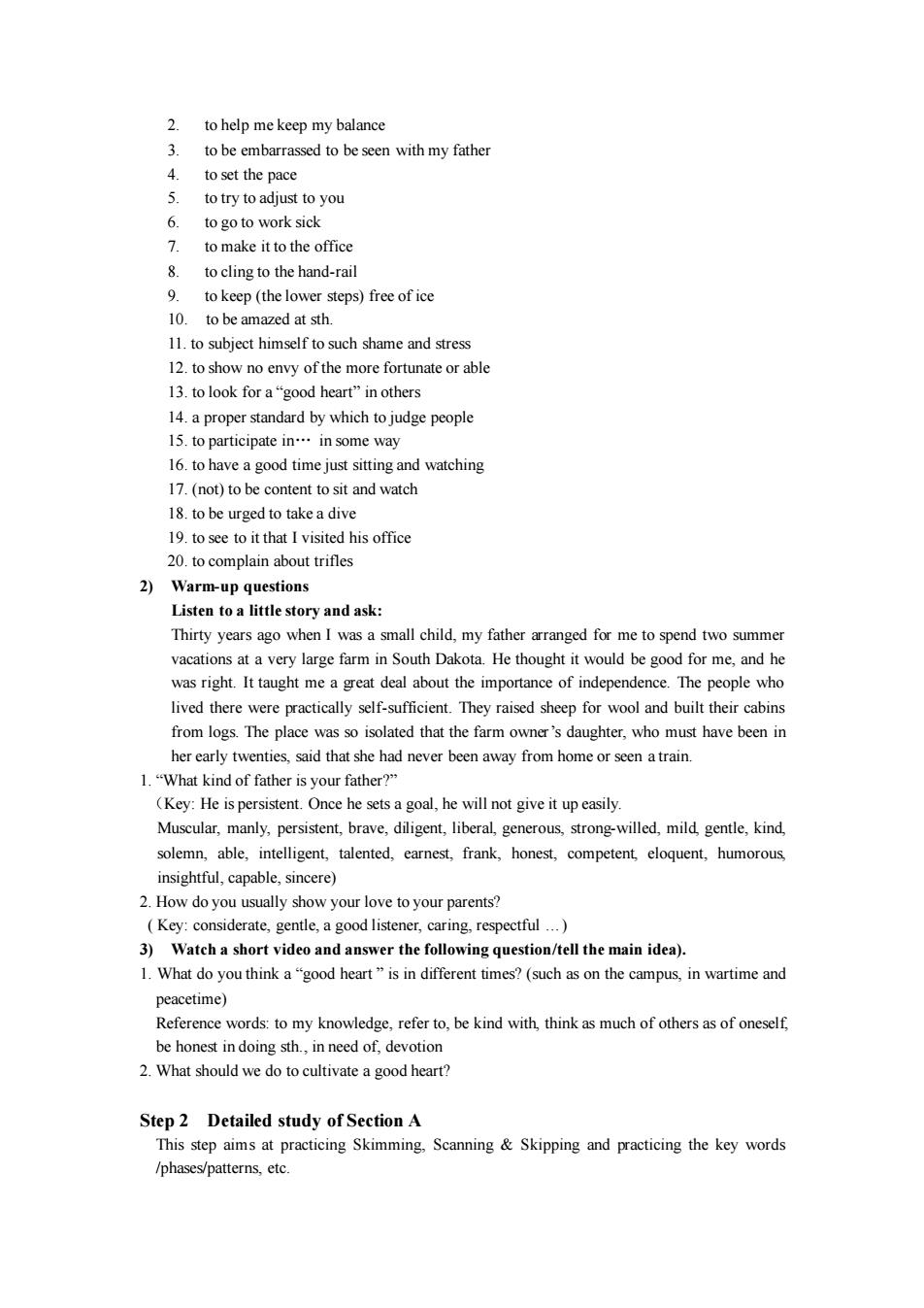
2 to help me keep my balance 3 tobe embarrassed to be seen with my father to set the pace to try to adjust to you 6. to go to work sick 7 to make it to the office tocling to the hand-rai 9 to keep(the lower steps)free ofice 10.to be amazed at sth 11.to subiect himself to such shame and stress 12.to show no envy of the more fortunate or able 13.to look for a"good heart"in others 15.to participate in'.in some way 16.to have a good time just sitting and watching 17.(not)to be content to sit and watch 18.to be urged to takea dive 19.to sce 20.ocomplain it that Ivisited Warm-up questions Listen to a little story and ask: Thirty vears ago when I was a small child.my father arranged for me to spend two summer vacat a ve ery large farm in South Dakota.He thought it would be good for me.and he was right.It taught me a great deal a e.The people wh lived there were practically self-sufficient.They raised sheep for wool and built their cabins from logs.The place was so isolated that the farm owner's daughter,who must have been in her early twenties.said that she had never been away from home or seen a train 1."What kind of father is your father?" He is p sistent on e he esets goal,he will not give it upeasily Muscular,manly,persistent,brave,diligent,liberal generous,strong-willed,mild gentle,kind. solemn,able,intelligent,talented,earnest,frank,honest,competent eloquent,humorous insightful capable sincere) 2.How do you usually show your love to your parents? (Kev 3) Watchashort video and answer the follwing/the main idea) I.What do you think a "good heart"is in different times?(such as on the campus,in wartime and peacetime) Reference words:to my knowledge,refer to,be kind with,think as much of others as of oneself. be honest in doing sth.,in need of,devotion 2.What should we do tocutivate a good heart Step 2 Detailed study of Section A This step aims at practicing Skimming.Scanning&Skipping and practicing the key words /phases/patterns,etc
2. to help me keep my balance 3. to be embarrassed to be seen with my father 4. to set the pace 5. to try to adjust to you 6. to go to work sick 7. to make it to the office 8. to cling to the hand-rail 9. to keep (the lower steps) free of ice 10. to be amazed at sth. 11. to subject himself to such shame and stress 12. to show no envy of the more fortunate or able 13. to look for a “good heart” in others 14. a proper standard by which to judge people 15. to participate in. in some way 16. to have a good time just sitting and watching 17. (not) to be content to sit and watch 18. to be urged to take a dive 19. to see to it that I visited his office 20. to complain about trifles 2) Warm-up questions Listen to a little story and ask: Thirty years ago when I was a small child, my father arranged for me to spend two summer vacations at a very large farm in South Dakota. He thought it would be good for me, and he was right. It taught me a great deal about the importance of independence. The people who lived there were practically self-sufficient. They raised sheep for wool and built their cabins from logs. The place was so isolated that the farm owner’s daughter, who must have been in her early twenties, said that she had never been away from home or seen a train. 1. “What kind of father is your father?” (Key: He is persistent. Once he sets a goal, he will not give it up easily. Muscular, manly, persistent, brave, diligent, liberal, generous, strong-willed, mild, gentle, kind, solemn, able, intelligent, talented, earnest, frank, honest, competent, eloquent, humorous, insightful, capable, sincere) 2. How do you usually show your love to your parents? ( Key: considerate, gentle, a good listener, caring, respectful .) 3) Watch a short video and answer the following question/tell the main idea). 1. What do you think a “good heart ” is in different times? (such as on the campus, in wartime and peacetime) Reference words: to my knowledge, refer to, be kind with, think as much of others as of oneself, be honest in doing sth., in need of, devotion 2. What should we do to cultivate a good heart? Step 2 Detailed study of Section A This step aims at practicing Skimming, Scanning & Skipping and practicing the key words /phases/patterns, etc
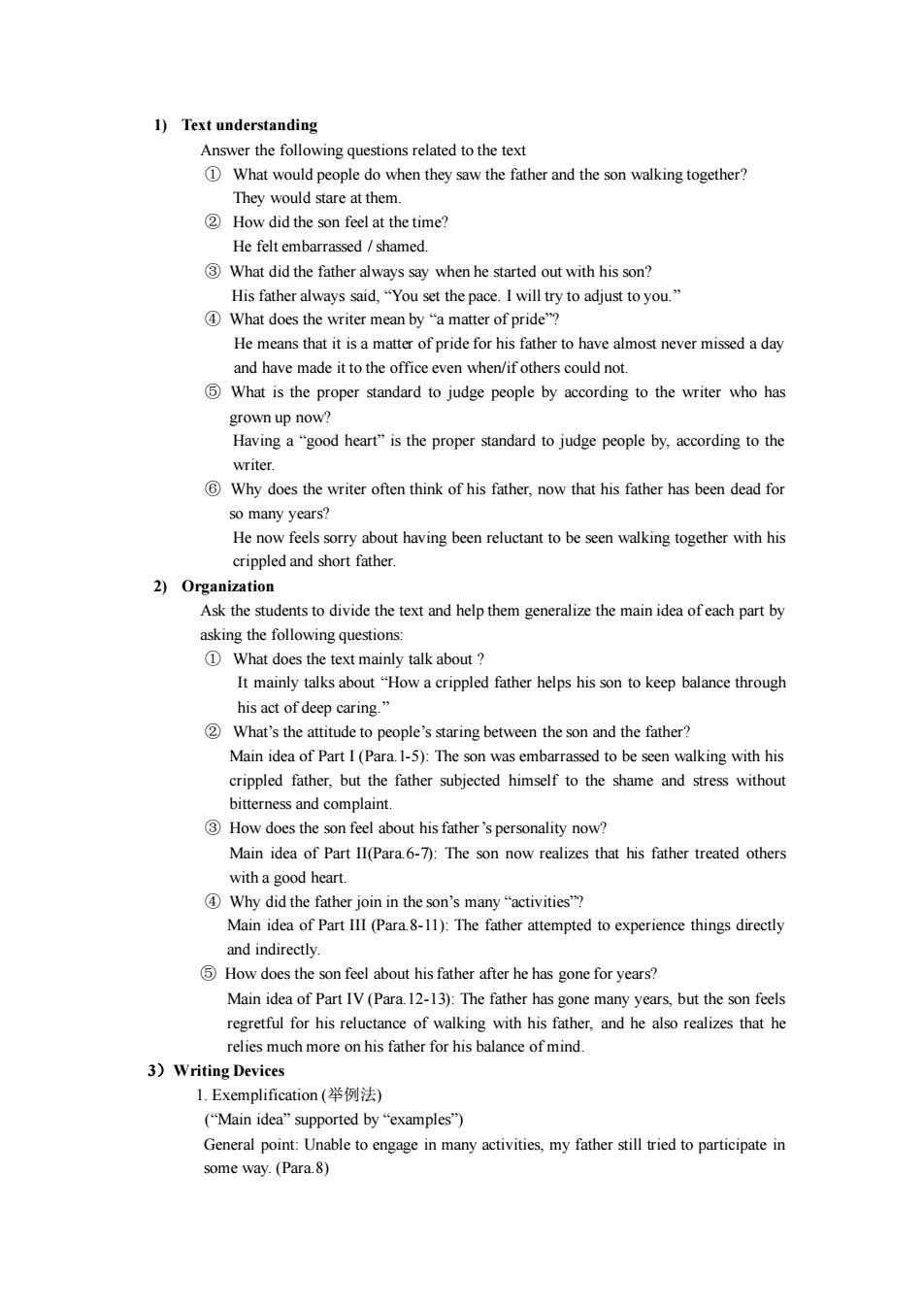
I)Text understanding Answer the following Inev wo ld stare at then How did the son feel at the time? He felt embarrassed shamed. What did the father always say when he started out with hisson? His father ways said. ."You set the pace.I will try to adjust toyou ④What does the writer mean by“matter of pride" He means that it is a matter of pride for his father to have almost never missed a day and have made it to the office even when/if others could not. What is the proper standard to judge people by according to the writer who has grown up now? Having a"good heart"is the proper standard to judge people by.according to the writer. 6 Why does the writer often think of his father.now that his father has been dead for so many vears? He now feels sorry about having been reluctant to be see walking together with his father 2)Organization Ask the students to divide the text and help them generalize the main idea of each part by asking the following questions: 1 What does the text mainly talk about It mainly talks a bout"How a crippled father helps his son to keep balance throug his act of deep caring." 2What's the attitude to people's staring between the son and the father? Main idea of Part I(Para.1-5):The son was embarrassed to be seen walking with his crippled father,but the father subjected himself to the shame and stress without hitt ness and complaint How does the son feel about his father's personality now Main idea of Part II(Para.6-7):The son now realizes that his father treated others with a good heart 4 Why did the father ioin in the son's many "activities Main idea of Part(Para-11):The father attempted to experience things directly and indiret How does the son feel about his father after he has gone for years? Main idea of Part IV (Para.12-13):The father has gone many vears.but the son feels regretful for his reluctance of walking with his father,and he also realizes that he relies much more on his father for his balance of mind. 3)Writing Devices 1.Exemplification(举例法) ("Main idea"supported by "examples) General point:Unable toengage in many activities,my father still ried to participate in some way.(Para.8)
1) Text understanding Answer the following questions related to the text ① What would people do when they saw the father and the son walking together? They would stare at them. ② How did the son feel at the time? He felt embarrassed / shamed. ③ What did the father always say when he started out with his son? His father always said, “You set the pace. I will try to adjust to you.” ④ What does the writer mean by “a matter of pride”? He means that it is a matter of pride for his father to have almost never missed a day and have made it to the office even when/if others could not. ⑤ What is the proper standard to judge people by according to the writer who has grown up now? Having a “good heart” is the proper standard to judge people by, according to the writer. ⑥ Why does the writer often think of his father, now that his father has been dead for so many years? He now feels sorry about having been reluctant to be seen walking together with his crippled and short father. 2) Organization Ask the students to divide the text and help them generalize the main idea of each part by asking the following questions: ① What does the text mainly talk about ? It mainly talks about “How a crippled father helps his son to keep balance through his act of deep caring.” ② What’s the attitude to people’s staring between the son and the father? Main idea of Part I (Para.1-5): The son was embarrassed to be seen walking with his crippled father, but the father subjected himself to the shame and stress without bitterness and complaint. ③ How does the son feel about his father’s personality now? Main idea of Part II(Para.6-7): The son now realizes that his father treated others with a good heart. ④ Why did the father join in the son’s many “activities”? Main idea of Part III (Para.8-11): The father attempted to experience things directly and indirectly. ⑤ How does the son feel about his father after he has gone for years? Main idea of Part IV (Para.12-13): The father has gone many years, but the son feels regretful for his reluctance of walking with his father, and he also realizes that he relies much more on his father for his balance of mind. 3)Writing Devices 1. Exemplification (举例法) (“Main idea” supported by “examples”) General point: Unable to engage in many activities, my father still tried to participate in some way. (Para.8)
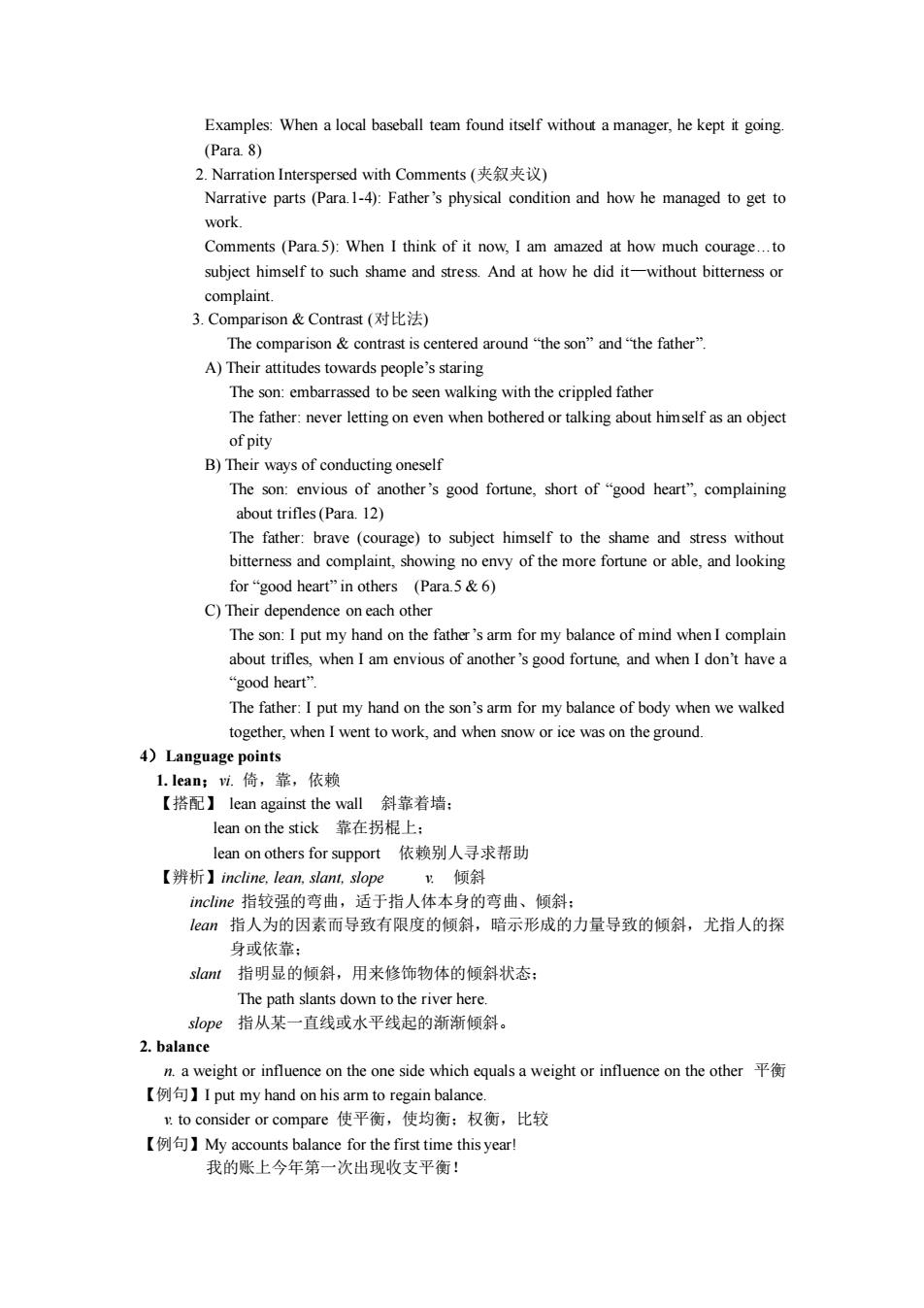
Examples:When a local baseball team found itself without a manager,he kept it going 2.Narration Interspersed with Comments(夹叙夹议) Narrative parts (Para.1-4):Father's physical condition and how he managed to get to work Comments (Para 5):When I think of it now.I am amazed at how much courage.to subject himself to such shame and stress.And at how he did it-without bitteess o complaint 3.Comparison&Contrast(对比法) The comparison contrast is centered around "the son"and"the father' A)Their attitudes towards people's staring The son:embarrassed to be seen walking with the crippled father The father.never lettingon even when bothered or talking about himsef asan object of pity B)Their ways of conducting oneself The son:envious of another's good fortune,short of"good heart",complaining about trifles (Para 12) 装mnr age)to subject himself to the shame and stres s without for"good heart"in others (Para5&6) C)Their dependence on each other The son:I put my hand on the father's arm for my balance of mind when I complain about trifles,when I am envious of another's good fortune,and when I don't have a ood heart" The father:I put my hand on the son's arm for my balance of body when we walked together,when I went to work,and when snow or ice was on the ground. 4)Language points 过.格,靠。依赖 【搭配】lean against t a斜靠着培 lean on the stick靠在拐棍上: lean on others for support依赖别人寻求帮助 【辨析】incline,lean,san,sope "顷笔 incline指较强的弯曲,适于指人体本身的弯曲、倾斜: am指人为的因素而导致有限度的倾斜,暗示形成的力量导致的倾斜,尤指人的探 身成依岁 sa指明显的倾斜,用来修饰物体的领斜状态: The path slants down to the river here. soDe指从某一直线或水平线起的渐渐颜斜 2.balance a weight or influence on the one side weightor influence on the other 【例句】I put my hand on his arm to regain balance to consider or compare使平衡,使均衡:权衡,比较 【例句】My accounts balance for the first time this year! 我的账上今年第一次出现收支平衡!
Examples: When a local baseball team found itself without a manager, he kept it going. (Para. 8) 2. Narration Interspersed with Comments (夹叙夹议) Narrative parts (Para.1-4): Father’s physical condition and how he managed to get to work. Comments (Para.5): When I think of it now, I am amazed at how much courage.to subject himself to such shame and stress. And at how he did it—without bitterness or complaint. 3. Comparison & Contrast (对比法) The comparison & contrast is centered around “the son” and “the father”. A) Their attitudes towards people’s staring The son: embarrassed to be seen walking with the crippled father The father: never letting on even when bothered or talking about himself as an object of pity B) Their ways of conducting oneself The son: envious of another’s good fortune, short of “good heart”, complaining about trifles (Para. 12) The father: brave (courage) to subject himself to the shame and stress without bitterness and complaint, showing no envy of the more fortune or able, and looking for “good heart” in others (Para.5 & 6) C) Their dependence on each other The son: I put my hand on the father’s arm for my balance of mind when I complain about trifles, when I am envious of another’s good fortune, and when I don’t have a “good heart”. The father: I put my hand on the son’s arm for my balance of body when we walked together, when I went to work, and when snow or ice was on the ground. 4)Language points 1. lean;vi. 倚,靠,依赖 【搭配】 lean against the wall 斜靠着墙; lean on the stick 靠在拐棍上; lean on others for support 依赖别人寻求帮助 【辨析】incline, lean, slant, slope v. 倾斜 incline 指较强的弯曲,适于指人体本身的弯曲、倾斜; lean 指人为的因素而导致有限度的倾斜,暗示形成的力量导致的倾斜,尤指人的探 身或依靠; slant 指明显的倾斜,用来修饰物体的倾斜状态; The path slants down to the river here. slope 指从某一直线或水平线起的渐渐倾斜。 2. balance n. a weight or influence on the one side which equals a weight or influence on the other 平衡 【例句】I put my hand on his arm to regain balance. v. to consider or compare 使平衡,使均衡;权衡,比较 【例句】My accounts balance for the first time this year! 我的账上今年第一次出现收支平衡!